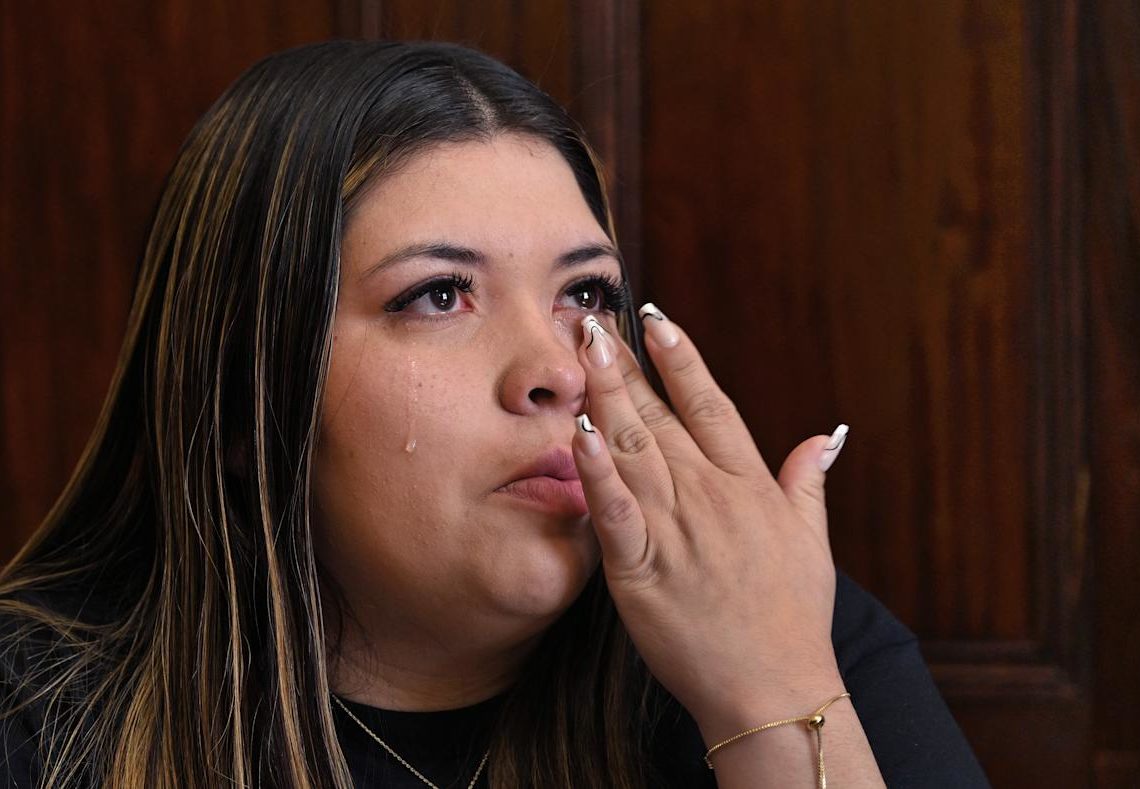The wife of Kilmar Abrego García, the Maryland man mistakenly deported to a notorious prison in El Salvador by the Trump administration, has been moved to a safe house by supporters after U.S. officials posted a court document on social media that included the family’s address.
Jennifer Vasquez Sura said in an interview with The Washington Post that she began fearing for her safety and that of their three children – two of whom are autistic – after verbal attacks on her husband by President Donald Trump himself, as well as taunts on social media by administration officials and Salvadoran President Nayib Bukele.
The couple’s home was usually filled by the sounds of a burgeoning family, including pans clattering while her husband cooked, the three kids tumbling through the day, the TV humming in the background. Now, she is on her own with the children – one nonverbal and another prone to seizures – and their new home is uncomfortably silent.
Vasquez Sura is also overwhelmed by the glaring spotlight of the legal battle over her husband’s case, which has become a lightning rod for the president’s broader effort to deport millions who have entered the United States illegally – regardless of whether, like Abrego Garcia, they later obtained protections barring deportation. She nevertheless has become her husband’s fiercest advocate.
“I didn’t even think it would become this big – it just happened,” Vasquez Sura said in an interview with The Post. “But if God threw me in this, I know he’s going to take me out of it. So this is God’s battle. And I’m going to fight it – for Kilmar and for everyone.”
The laughter that used to fill the family’s home has been replaced by muffled crying – or the quiet murmur of her youngest son cuddling with the neon construction vest her husband left behind. The texts Vasquez Sura and her children still send to Abrego García go unanswered, marked only by a single gray check mark.
“Honestly,” Vasquez Sura said, with tears pooling in her eyes, “I just want my husband back, my best friend back, my kids’ father back. I want our life back.”
– – –
A family history politicized
Vasquez Sura, a U.S. citizen, met Abrego García in 2016, introduced by a co-worker who happened to be one of his closest friends. They didn’t start dating right away. For nearly two years, they stayed in each other’s orbit, as Vasquez Sura tried to recover from an abusive relationship and focus on raising the two kids born from it.
The eight years that followed have become fodder for the legal and political fight over her husband’s future, with the Department of Homeland Security and White House press secretary Karoline Leavitt both posting to X a 2021 domestic violence petition filed by Vasquez Sura that she quickly abandoned.
Vasquez Sura acknowledged that the relationship hadn’t been perfect. There were fights, dark seasons, moments when the weight of everything – money, parenting, trauma from a 2019 immigration detention that is at the root of the current legal case – felt like it might break them.
Vasquez Sura watched her husband try to claw his way out of a severe depression that took hold after he was detained for seven months by U.S. Immigration and Customs Enforcement. The arrest was a shock for them after federal officials, relying on a since-decommissioned Prince George’s County police gang registry, accused him of being an active member of MS-13 – a claim he has vehemently denied.
Abrego García, who fled El Salvador as a teenager because of gang threats, had nightmares so vivid he cried in his sleep, his body drenched in sweat by morning, his wife said.
“He never talked about them, but I could see it,” Vasquez Sura said.
They built their life around the needs of others. Their youngest son – nonverbal, autistic, afraid of loud noises – needs constant supervision. One Fourth of July at the Potomac River, their daughter, who had been swimming, collapsed with a seizure shortly after getting out. Abrego García, unable to stop the convulsions, sobbed, Vasquez Sura recalled.
In June 2021, the pressure boiled over during an argument in the car over money while their baby sat in the back seat.
Abrego García became angry, insulting her while driving erratically. Later, they argued again, and he struck Vasquez Sura, leaving her with bruises and a scratch over her left eye, according to a petition for an order of protection for which she never showed up to court. The incident was singular, she said, attributing it to the strain of the immigration detention and of being a parent without steady work.
“Look, Kilmar is not perfect – nobody is,” she said. “Day by day, you grow. Every day, you learn. And he was trying his best for me, for our kids, for our future.”
– – –
The first encounter with ICE
Their first date was just lunch at his construction site, parked in his car. But it told her everything, she said.
“What caught my attention was that he brought to the car two juices and two lollipops,” Vasquez Sura said. The juices were for them. The lollipops, for Vasquez Sura to take to her kids. “We were very young, so for a man to include your children from the beginning – it showed he was a keeper.”
From then on, he slipped quietly into their rhythm – the school drop-offs, the late-night grocery runs, the small rituals of everyday life. He never waited to be asked, Vasquez Sura said. He just showed up.
When Vasquez Sura got pregnant at the end of 2018, the joy came laced with complications: weekly injections, constant monitoring, days she could barely stand. Abrego García picked her up from work as an assistant at a chiropractor’s office each afternoon. Her co-workers learned to spot his car before she did, calling her over whenever they saw him pulling in.
He would bring her breakfast and a Slurpee without saying a word.
“He just knew,” Vasquez Sura said. “He knew everything I needed without me saying a word. I’m convinced we were twins in another life.”
But just as they were settling into life together and preparing for the birth of their son, everything unraveled on March 28, 2019 – when police detained Abrego García as he stood outside a Home Depot seeking work.
When he didn’t show up to pick her up that day – and didn’t reply to her calls or texts – Vasquez Sura said, she felt the first spark of anger. But as night fell, that ire gave way to panic.
Vasquez Sura began contacting Abrego García’s relatives, friends and acquaintances.
Little by little, she came to find out that what had begun as a seemingly random approach by local police had morphed into ICE removal proceedings against Abrego García, driven by the Prince George’s County police claim that he was an active member of an MS-13 clique based in Upstate New York, a place he has never lived.
The police detective who filed that report was later charged with official misconduct and fired after he passed on information to a sex worker he hired about an investigation into the brothel she ran.
The allegation, Vasquez Sura said, was surprising, seemingly coming from nowhere.
Around 11 a.m. the day after her husband’s arrest, he called her from ICE custody.
“It was like putting pieces of puzzles together because we were all confused,” Vasquez Sura said. “He didn’t even know why he was there for.”
Vasquez Sura found a lawyer. She went to every court hearing, where she saw government attorneys paint Abrego García as a hardened criminal while he recounted how a gang in El Salvador attempted to extort his mother’s pupusa shop and then threatened to kill him if he didn’t join their ranks, causing the family to send him north when he was 16. She visited Abrego García every Saturday at an ICE detention center in a Baltimore suburb and held on to the drawing he had made for the kids of their names in different colors and fonts.
That June, Vasquez Sura walked into the ICE office in Baltimore wearing a white dress. She was six months pregnant, and they had decided to get married. There was no aisle or music – just a glass divider and an officer passing their rings back and forth.
“It was emotional, because you would think on your wedding day, you’ll be next to the person,” she said.
The only photo from that day shows her walking out of the building alone.
Two months later, Vasquez Sura was testifying on Abrego García’s behalf during an immigration hearing when labor contractions began. The next morning, they returned with a vengeance. When Abrego García made his daily phone call, she was on the floor in pain. “You got this,” she recalled him saying. “You’re strong.”
Their son was born at 4:34 p.m. that day.
After the immigration judge found Abrego García’s fears of persecution credible and ordered that he be released with a bar against being sent back to El Salvador, Vasquez Sura picked him up with their baby in tow. They crossed the street to a McDonald’s, ordered some food and then drove to a toy store, buying small gifts to surprise their two older kids after school.
“They ran to him,” Vasquez Sura said. “They were so happy. They just couldn’t believe that he was already home.”
It felt, briefly, like the hard part was behind them.
– – –
Bigger dreams, then a nightmare
They attempted to settle into a calm normalcy.
Vasquez Sura sent out his résumé to a sheet metal workers union, which, last year, granted him an apprenticeship and a stable job “he absolutely loved,” Vasquez Sura said. Health insurance from the new job allowed him to consider seeking therapy.
Sometimes Abrego García took the kids on hot dog runs, filming them dancing in the car. He texted his daughter in English; she replied in Spanish, both of them learning. On holidays, Vasquez Sura made sure they all wore matching outfits.
“It felt like we were almost there,” Vasquez Sura said.
They began dreaming bigger: A new house with a backyard full of trampolines. Maybe a second wedding. Maybe another baby.
Then, on March 12, ICE agents detained him while he was driving to pick up their two eldest children from a school bus stop, with their now 5-year-old nonverbal son in the back seat.
Abrego García called Vasquez Sura, and she heard an ICE officer tell him his status “had changed.” She rushed over to pick up their child.
Vasquez Sura headed home and walked through the door clutching Abrego García’s keys, her face streaked with tears. The kids, hearing the jingle, rushed to the door, convinced it was him. “Wait, Daddy!” they called, fumbling with the top lock. Her 9-year-old son blinked up at her. “Why are you home?” he asked.
Her daughter, 10, stopped in the hallway, staring at Vasquez Sura’s face, asking: “What happened?”
She kept telling herself what she had once believed in 2019: If they had gotten through it before, they could do it again. But this time, something felt different. “It just didn’t feel right,” she said.
Abrego García was shuffled across the country in a dizzying chain of transfers – from Maryland to Florida, Georgia, Louisiana.
On March 15, he called Vasquez Sura in a panic. He had heard rumors that he was being sent to El Salvador’s megaprison for some of its worst gang members. Vasquez Sura tried to calm him before they hung up.
A sister-in-law in El Salvador she called drove to the airport there and saw police activity while trying to spot her brother. Then came the photos from inside the prison showing a man with a shaved head, tattoos down his arm and two scars on his scalp.
“I just knew,” Vasquez Sura said. “I knew it was him.”
Since then, the days have unfolded like a mosaic of lost moments. So Vasquez Sura writes it all down – texting her husband daily updates so he won’t miss the life he’s still part of.
The children text him, too. One night this week, Vasquez Sura watched her daughter send Abrego García a photo of her sleeping brother, along with a message that read: “He misses you.”
The political animosity surrounding the case has reached worrying new heights amid the Trump administration’s full-throated effort to paint Abrego García as a violent criminal.
When DHS shared with its 2.4 million followers on X the order of protection petition that prominently features their address, it was time to move the kids to an undisclosed location.
“I don’t feel safe when the government posts my address, the house where my family lives, for everyone to see, especially when this case has gone viral and people have all sorts of opinions,” Vasquez Sura said. “So, this is definitely a bit terrifying. I’m scared for my kids.”
A DHS spokesperson did not respond Monday to a request for a comment about the department’s decision not to redact the family’s address in the post.
When she spirals – when the online hate grows too loud or the news starts spinning a version of Abrego García she doesn’t recognize – her children are the ones who pull her back. They take the phone from her hands. They mute the television. “No, Mami,” they tell her. “Don’t listen to that. Whatever they’re saying, that’s not who Kilmar is. We know who Kilmar is.”
The man they know is the one featured on the T-shirt she wore during the interview, showing them all together at Christmas before the tree, looking like a happy family. It has become her uniform on what has been a roller coaster of emotion.
As she spoke inside the CASA advocacy group’s multicultural center in Hyattsville, Maryland, that ride lurched again toward hope.
“Jennifer! Jennifer!” said Ama Frimpong, CASA’s legal director, running in, out of breath and smiling. “The Fourth Circuit just denied the government’s motion to stay the case.”
Vasquez Sura blinked. The words about a decision in which the appeals court excoriated the Trump administration for repeatedly bucking a federal judge’s orders sank in. Then she smiled.
Hours later, a surprise call from Sen. Chris Van Hollen (D-Maryland) came, sharing the news that he had met with Abrego García in San Salvador and that he was healthy. The senator later reported that Abrego García expressed concern during their conversation for the welfare of his wife and children.
“It was very overwhelming,” Vasquez Sura told ABC News the following morning, appearing exhausted during yet another media appearance.
Then – as Trump administration officials mocked the visit in social media posts and began sharing a dossier they had compiled that, among other things, depicted Abrego García as a human trafficker – she returned to her life in the safe house.
Back to the unbearable silence.
Related Content
Freedom Riders faced a mob at this bus station. DOGE wanted to sell it.
The Abrego García case: A timeline and assessment of key documents
Trump brushes aside courts’ attempts to limit his power
The post Her husband was mistakenly deported. Now she’s caught in a political frenzy. appeared first on Washington Post.




